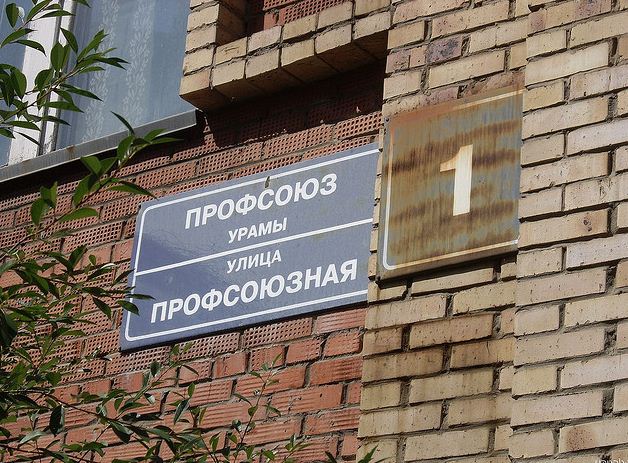
Russian Activists Complain About the Tatarization of Tatarstan
Publication: Eurasia Daily Monitor Volume: 11 Issue: 95
By:

The World Forum of Tatar Youth recently staged a game called “Tatar Watch” in Kazan, the capital of the Russian Middle Volga republic of Tatarstan. The “Tatar patrols,” as they called themselves, went around the city in groups of seven people, wearing T-shirts that said in Tatar “I speak Tatar,” and documented restaurants that were in breach of the republican law on state languages. The Tatar youth activists also took photographs of signboards in Tatar that contained errors. Also, the activists compiled a list of Tatar-friendly public eateries for those who would like to spend their time and money there (https://www.ng.ru/regions/2014-04-25/3_kartblansh.html).
According to Tatarstan’s laws, both Russian and Tatar are the official languages of the republic, but many public offices prefer to use only Russian. Tatarstan is known for various initiatives by Tatar activists to boost their traditions and language. The republic is relatively well positioned to do so, since ethnic Tatars comprise a sizeable minority in the Russian Federation and Tatarstan has enjoyed a windfall of revenues from its booming oil business. Tatarstan’s efforts to improve the state of the Tatar language, however, have evoked significant resentment among ethnic Russians, whose activists denigrate the Tatar language, dismiss its popularity even among ethnic Tatars themselves and vehemently oppose what they see as the forcible imposition of Tatar culture not only on ethnic Russians, but also on the Russified Tatars.
According to the Nezavisimaya Gazeta newspaper’s correspondent in Kazan, Gleb Postnov, who is known for his critical attitude toward the Tatars, the fact that Tatar activists are promoting the Tatar language indicates that interest for the language is dying. Many Tatar children attend Sunday schools organized by the Russian Orthodox Church in Kazan, he wrote. Moreover, Postnov alleged that ethnic Tatars, or at least people with Tatar names, are sometimes found among Russian nationalists in Kazan (https://www.ng.ru/regions/2014-04-25/3_kartblansh.html).
However, if the Tatar nation and Tatar language are in such a deplorable state, it is not exactly clear why a Russian reporter in Kazan is so indignant about Tatar activists’ efforts to popularize their culture.
Ethnic Russians in Tatarstan are increasingly voicing concern over what they regard as the Tatarization and Islamization of Tatarstan. According to the chairman of the Society of the Russian Culture of Tatarstan, Mikhail Shcheglov, there are only 225 churches in Tatarstan and a whopping 1,524 mosques. In Kazan, there are 30 churches and 60 mosques, and 11 mosques and only 1 church are under construction in the city, while Shcheglov estimates that there are more Christian Orthodox residents than Muslim residents in the republic’s capital. Several historical churches in the republic are still used as museums, the Russian activist complained.
Russian activists say that Christian Tatars, also known as Kryashen Tatars, are being assimilated by the majority Muslim Tatar community. The Russian Orthodox Church is ignoring the plight of the Kryashen Tatars, according to their leader, Arkady Fokin, who quoted a Russian Orthodox priest in the republic as saying: “Why should we pay attention to you, you soon will cease to exist anyway” (www.regnum.ru/news/fd-volga/tatarstan/1802296.html). Again it is unclear why the Tatarization of Christian Tatars is worse than their Russification.
Sensing the rise of Tatar identity in Tatarstan, Moscow is employing the same tools there that it has used in the North Caucasus, such as the Russian Orthodox Church and Cossacks. However, both those institutions are also in profound crisis. The Russian Orthodox Church in Tatarstan was shaken by sex scandals, while Cossacks in the republic are a marginal force with little support from the population. One Cossack leader, Alexei Loginov, complained that the republican administration simply dismissed his application for registration on the pretext that “there have been no Cossacks here and will not be in the future.” The notorious Russian Orthodox cleric Vsevolod Chaplin visited Tatarstan in May, but reportedly avoided meeting Russian activists in the republic because he was under constant observation of the Tatarstani president’s administration and the official Russian Orthodox Church clergy in the republic. Chaplin promised to return to Tatarstan and meet with Russian activists (www.regnum.ru/news/fd-volga/tatarstan/1802296.html).
Meanwhile, with Russia’s annexation of Crimea in March, Tatarstan acquired more leverage against Moscow: its ethnic kin who reside on the peninsula. Even though the Crimean Tatars are not very numerous, they are politically active and live in a politically highly salient region. Moscow is trying to use Tatarstan and its leadership to mollify the Crimean Tatars. On May 16, a Tatarstani official, Elmira Ablyalimova, announced the republic had allotted nearly $200,000 for rebuilding a museum complex in Bakhchisarai in Crimea (www.regnum.ru/news/fd-volga/tatarstan/1802841.html).
Officials from Tatarstan frequently visit Crimea, and Crimean officials regularly travel to Tatarstan. On May 13, the Crimean State Council head Vladimir Konstantinov and Crimea’s First Deputy Prime Minister Rustam Temirgaliev visited Kazan. Konstantinov alleged that the Crimean Tatars were hostile to Crimea’s administration because they were being financed by Kyiv—which, of course, he said was in turn financed by the West. Konstantinov said relations between the Crimean authorities and Crimean Tatars would improve in the wake of Russia’s annexation of the peninsula (www.regnum.ru/news/fd-volga/tatarstan/1801214.html).
However, on May 16, the pro-Russian head of Crimea’s administration, Sergei Aksyonov, issued a decree prohibiting any public demonstrations until June, while the Crimean Tatars were planning a demonstration commemorating the 70th anniversary the group’s deportation by Joseph Stalin’s government (https://www.gazeta.ru/politics/2014/05/17_a_6037401.shtml).
The authorities ultimately allowed the commemoration to take place, but attempted to play down the importance of the date for the Crimean Tatars, dropping their name from the announcement and restricting the emblems and slogans they could use (https://www.newsru.com/russia/13may2014/crimtatar.html).
Crimea’s administration and Crimean Tatar activists are clearly on a collision course over this issue, and hardly anyone can blame that on the authorities in Kyiv or the West.
Russia’s annexation of Crimea plays into the hands of Tatarstan’s elites and activists because it increases their importance and leverage on the Russian authorities. Russian activists who expect Moscow will eventually restore their imperial status in Tatarstan are likely to remain disappointed for a long time given that, apart from everything else, Moscow now needs Tatarstan’s help in Crimea.




